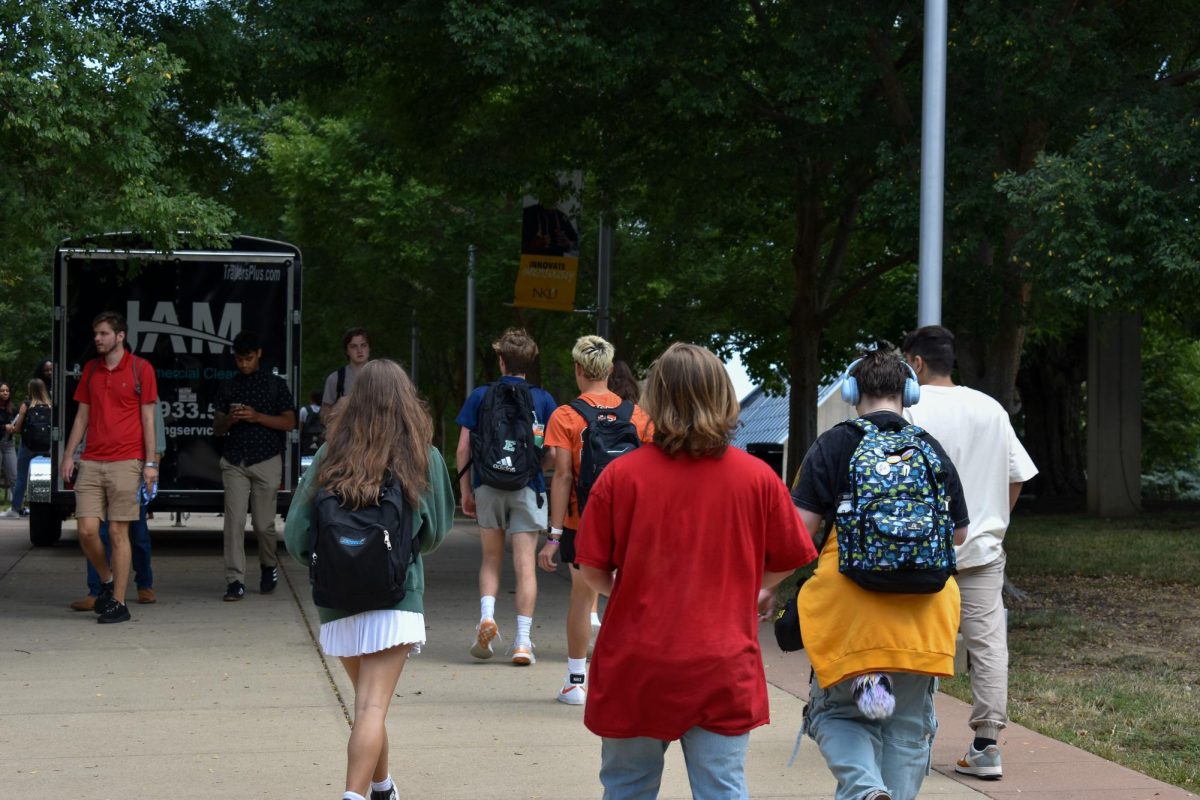The Northern Kentucky University Residence Hall Association (RHA) hosted a “town hall” on Tuesday in the Student Union. Students could ask panelists from housing, maintenance, dining and RHA a variety of questions as well as voice any concerns they had about campus life. Some questions were pulled from responses from a QR code that was available via an RHA flier, while others were asked in real time from students in attendance. The overwhelming majority of questions revolved around housing and were answered by University Housing Director Scott Patton.
“In years past, it’s been like pulling teeth to try and get students to come and actually give feedback on their residential experience,” said Patton. “Usually they come, they ask their question and then they leave and they don’t stay for the answer.”
RHA previously hosted similar events in the past, but with little involvement from students, they stopped. This year, the crowd started off quiet. When asked if anyone wanted to start off with a question, the speaker was met with silence. The event began by responding to questions previously submitted, but around halfway through, the crowd became more involved, asking questions that expanded on ones asked before.
Some of the concerns from students revolved around dining options on campus. One submitted question asked about the cultural inclusiveness of the protein options in the dining hall.
The resident district manager for NKU Dining, Derek Roorda, said that the way the menu is developed is on a “national level.”
NKU Dining is run by an organization called Chartwells. Roorda said that corporate chefs give a large number of menu items to around 400 campuses across the United States. From there, individual campuses will craft menus to fit their needs.
“It’s very easy for us, if we’re looking forward, to adjust protein bases,” Roorda said. “I encourage any student that has a food need of any sort, whether that be religious, allergen or whatever… All that needs to happen is use the Dine On Campus app to get in touch with us.”
Another topic brought from the QR code list of responses was the concern for stalking issues on campus. Patton responded with what housing can do to support students who are experiencing stalking.
“From a housing lens, anytime there’s a student concern about that, as it pertains to stalking, our staff are trained and responsible for contacting NKUPD to file a report,” he explained. “And then also what our housing staff do if there’s a concern, we will have conversations.”
Patton said that while housing doesn’t control the law, it does provide support for students to help reassure their safety.
“If there’s space available and the person who is stalking you knows where you live and that makes you really uncomfortable, then let us help find you a space,” he said.
Other concerns from students in attendance revolved around student access to certain spaces within their dorms. Classroom access in University Suites and kitchen access in Callahan Hall were both mentioned as areas where students wanted access.
Patton explained that these spaces were likely closed off from students due to issues of abuse of the space in the past, however those rules can change with time.
“I think it really just is part of having a conversation with the leadership of the building and say ‘Hey, can we do something different than what’s always been done,’” he said.
The final question from the audience asked, “Why has Norse Commons been closing an hour earlier each year?”
This has been a recurring concern from students. The Northerner spoke with students on the matter earlier this semester and found that some students feel that the hours at Commons do not accommodate all students, especially those who take night classes
Roorda said, “The really simple, but yet more complicated answer to that question is the number of students on campus coupled with something called the CPI.”
The CPI, or consumer price index, is how dining determines their pricing structure and hours of operation, according to Roorda. He explained that the majority of the changes in dining are due to the overall increased cost of goods since COVID-19.
“So the balancing act that we have in our responsibility to the student body is how do we make sure that we’re not passing that expense on to the meal plans,” Roorda continued.
Roorda said that the change in hours at Norse Commons comes from trying to balance these costs. To accommodate those changes, though, dining is looking into a ghost kitchen. This would allow students to place an order to be picked up at their chosen time, even if the dining hall is closed.
“We’re trying to be creative in not passing expenses on to the students, but still giving high quality and access to food,” said Roorda.
Majority of the concerns discussed at the town hall event were met with the same general reply from panelists: communicate.
“I just really am appreciative that so many of you have been here to be a part of the conversation and hear the response,” Patton said to the audience at the end of the event. “It means a lot that you all care enough to ask the question, hear the answers and then be a part of the solution.”


